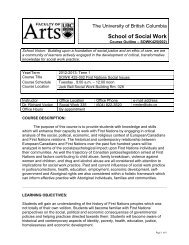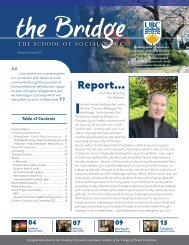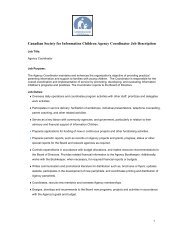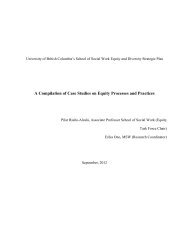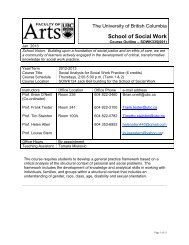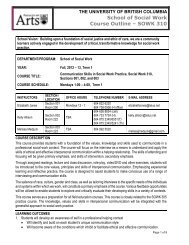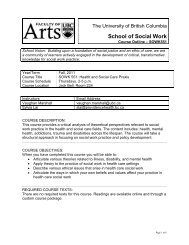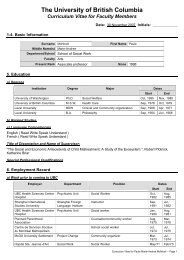Course Outline Format - School of Social Work - University of British ...
Course Outline Format - School of Social Work - University of British ...
Course Outline Format - School of Social Work - University of British ...
You also want an ePaper? Increase the reach of your titles
YUMPU automatically turns print PDFs into web optimized ePapers that Google loves.
SOWK550 (001) – 2012-2013<br />
COURSE STRUCTURE:<br />
This course will include a combination <strong>of</strong> lecture, seminar, and small group meetings. Class<br />
members are expected to attend every class, to complete required readings prior to class, and<br />
to arrive in class prepared to participate. Student participation in class discussions will be<br />
evaluated in part on the alacrity with which comments and reflections are <strong>of</strong>fered. Additionally,<br />
there is an expectation that differing opinions, analyses, and life experiences will be discussed<br />
in a respectful manner. Such an exchange contributes to the learning <strong>of</strong> all and requires the<br />
development <strong>of</strong> emotion regulation, a skill very important to the practice <strong>of</strong> social work at the<br />
master’s level.<br />
Generally, the first half <strong>of</strong> the class will consist <strong>of</strong> a presentation by the instructor. Generally, the<br />
second half <strong>of</strong> class will involve student participation in a large group activity or in small groups<br />
formed on the basis <strong>of</strong> a student’s field <strong>of</strong> practice (e.g., health, including mental health; social<br />
care; children and family). At the discretion <strong>of</strong> the pr<strong>of</strong>essor, some classes may deviate from this<br />
format.<br />
Evaluative tools are described below.<br />
<strong>Course</strong> Context and Prerequisites:<br />
This course is a mandatory first course for students in the Advanced year <strong>of</strong> the M.S.W.<br />
REQUIRED AND RECOMMENDED READING:<br />
Hankivsky, O. (2004). <strong>Social</strong> Policy and the Ethic <strong>of</strong> Care. UBC Press: Vancouver.<br />
Ife, J. (2008). Human Rights and <strong>Social</strong> <strong>Work</strong>: Towards Rights-Based Practice. Cambridge:<br />
Cambridge <strong>University</strong> Press.<br />
In addition, there are a number <strong>of</strong> journal articles. All <strong>of</strong> these articles can be found on the<br />
library website in ejournals; otherwise, hyperlinks are provided.<br />
ASSESSMENT, GRADING, EVALUATION:<br />
1. Weekly Reflective Journals (20%): Students will complete, each week, a one-page<br />
reflective journal that demonstrates integration <strong>of</strong> course material. The purpose <strong>of</strong> these<br />
journals is to allow students dialogical space in which to: respond affectively, think critically,<br />
and metabolize the main ideas <strong>of</strong> the course. Creativity is invited, and genuine engagement<br />
with ideas is expected and appreciated. At least seven journal entries should meaningfully<br />
incorporate readings. The first journal entry should respond to <strong>Social</strong> <strong>Work</strong> Orientation,<br />
which will be attended by all students in the course.<br />
2. Bi-Weekly Group Discussions (10%): In Week 3, students will form small groups based on<br />
chosen fields <strong>of</strong> practice. On assigned days, group members will choose an article to<br />
discuss with their respective small group examining a social justice issue within the group’s<br />
chosen field <strong>of</strong> practice. The course TA will visit groups on a rolling basis and provide<br />
discussion facilitation and support, as needed. The instructor and TA can provide article<br />
Page 2 <strong>of</strong> 7



